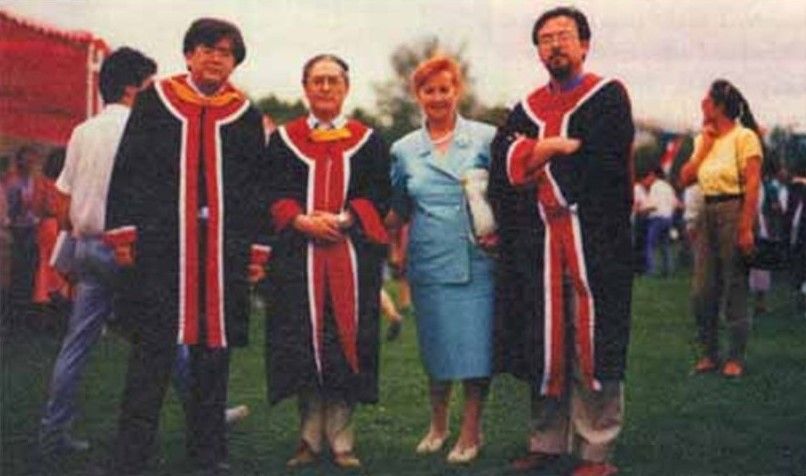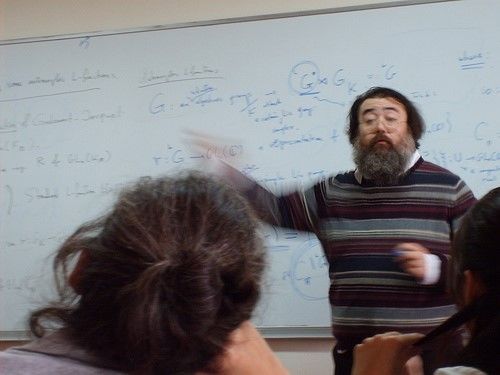An Interview with Prof. Dr. Kazım İlhan İkeda
Translation from Turkish to English: Oğuz Şavk
Our guest in this issue is mathematician Prof. Dr. Kazım İlhan İkeda who is also one of the founding members of the Academy of Science and Enlightenment. He continues his work in the Langlands program, which is called the unified theory of mathematics, where mathematical theories are mutually and integrally addressed. We talked to him about the content, nature, methodology, philosophy, history and future of mathematics.
First of all, thank you for accepting to interview. Can you introduce yourself to the readers?
My research area is algebra and number theory. In particular, I continue my research on representation theory of groups, algebraic number theory and automorphic forms. I'm working specifically on the Langlands Program. In 1989, I got my B.S. degree from METU Mathematics Department. Four years later, I got my Ph.D. degree in mathematics from Princeton University. Between 1993 and 1996, I worked as a researcher at TÜBİTAK Institute of Basic Sciences and then at Feza Gursey Institute of TÜBİTAK between 1996 and 2003. TÜBİTAK then made a wrong decision to deactivate our institute. Thereupon I worked at İstanbul Bilgi University and Yeditepe University respectively. Now, I am at the Department of Mathematics in Boğaziçi University.
How did you decide to become a mathematician?
My father was a mathematician, and we had a lot of math books in our house. I loved so much to glance on my father's library at a very young age, I would look at lots of books and I would like to look at the symbols and diagrams in these books. I decided that these were very important things at that age. Then one day I noticed an algebra book, at the beginning of high school, Jacobson's algebra book. I started reading that book. Although I did not understand at first, I persevered and read. I've driven places which I don't understand. After a while I finished that book and realized that I had learned something. I even made some proofs with my own effort. Of course, in this case, human becomes very happy... As I thought about mathematics for a while, I had my own opinions about mathematics. Then I decided to become a mathematician. Of course, my family, especially my father's support and encouragement is so great that I take this decision. I feel lucky to be a mathematician...

There is a common perception in society that “mathematics” is a scientific endeavour that only “intelligent” people can do. What do you think about that?
A large part of the society is unsuccessful in mathematics due to educational reasons. Mathematics is an unpopular and unexplained topic in the eyes of society. On the other hand, society is aware of the fact that from the most routine actions of everyday life to the extreme limits of modern science mathematics is used and it is extremely important. In addition, mathematics is one of the major subjects in the entrance exams of high school or university, that is, to be able to enter a good high school or a good university one must be mastered in mathematics. That's why society thinks like that... However, in order to be successful in mathematics in the real sense, I think that the essential qualities are to enjoy working with mathematics rather than intelligence, to dedicate life to mathematics and to persevere.
There is abstraction in every field of science. But the degree of abstraction that existing in mathematics creates the impression that mathematics is a product of mere human intelligence disconnected from nature. Do you think that's true?
Matter triggers thought. The mathematical theories have become so complex that the illusion emerges as thought predicts matter. Tensor analysis, for example... It was known before Einstein's theory of relativity. Einstein used this theory to explain a phenomenon of nature. Here now is the idea triggering the matter? No. Because the thing that made the thought was matter. Today's mathematics and physics are both abstracted from nature, but even though the level of abstraction is so high, we are not separated from nature. Therefore, we can apply it back. That's how it works...
If mathematics is derived from nature, then does it have to be subject to natural laws? Or shouldn't we apply dialectics to mathematics in a way, which is the framework for understanding nature?
Let me explain… The philosophical debates of the last century were arising from the differences in the applied methods doing in mathematics. For example, the “intuitionists” led by Brouwer did not accept proof made by the method of proof by contradiction. Hilbert's school adopted formalism. The question we are trying to answer here is much deeper and wider. Consider all possible mathematical theories. All the theories that we know and do not know, that have been proven in the past and that will be found in the future... I think we should also include the propositions in Gödel's sense... Let us denote that set by M. Of course, this may not be a well-defined set, but here we are doing a simple thought gymnastics. Let us also consider all the physical theories that we perceive and which we have not yet perceived. Both at the level of quantum (Planck length and below), at the level of relativity (Hubble length and beyond)... Let us denote that set by P. Mathematical theories have to contain all physical theories. Because the language of physics is already in mathematics... That is, the set P is the subset of the set M. So, I think the problem is evolving to this... Is the set of mathematical theories M and the set of physics theories P equal to each other? And which one precedes the other? Where do we start? What is the impulse? For example, Newton's theory of calculus emerges when examining basic mechanical problems… Let's consider the extremely important theory of Lie group representations developed by Harish-Chandra. While Harish-Chandra is in an effort to explain physical phenomena, he is fronting and developing this mathematical theory. The methods of dialectics are the methods which mathematicians use unconsciously while doing mathematics in everyday life. The unity of opposites, for example... In mathematics, it shows itself as "duality." In Galois Theory, for example, two different mathematical objects are inversely related. There is a reflection of a little push in one of the objects in the dual object. Sometimes it is easier to examine the type of one of the different types of mathematical objects in duality. In this case, we study the side that is examined easily and pull back the results we have obtained under duality, and we obtain the necessary information about the type which is difficult to examine. This holds for Langlands Program, which is so-called the "great unified theory "of mathematics. There are two dual mathematical theories. One is Galois representations, the other is automorphic representations. Even though the second theory seems to be much more difficult, we have many conclusions as a result of studies. With the Langlands duality, we can say a lot about the first theory, the Galois representations. Mathematics is very advanced and advanced vertically. The Langlands Program has a claim that it looks entirely at the subjects of mathematics or even physics. This is so crucial... The Langlands Program will definitely work for deciphering the connected components of mathematics more quickly. On the other hand, there are new approaches to the foundations of mathematics. In every hundred years, these foundations are undergoing revision... For example, 20th-century mathematics based on the set theory... There is a Russian mathematician Vladimir Voevodski, we recently lost him at a young age. He had come to Turkey. He has studies called "homotopy type theory". Instead of equality, he proposes homotopy, which is more general and finer concept. When I asked Voevodski if the theory he developed was going to be included in the books of first-year undergraduate mathematics students in the future, he said yes. And Voevodski's concern was to create computer programs that could make proofs or check the accuracy of proofs by using this theory. Now there is an alphaGO program that can beat professional GO players. That is, computers are developing very fast. On the other hand, the work of having the proof made or checked computer is very new but assertive. Returning to the beginning, I think the dialectical method should be placed on these foundations.

How do you assess developments of Turkey in mathematics?
As you know, mathematics in our country has become contemporary with mathematicians like Cahit Arf, Orhan İçen, Gündüz İkeda and so valuable professors. The mathematicians they raised also developed very good students over the years. At the universities formed mathematics departments comprised. Especially in Istanbul and Ankara. First, undergraduate programs are formed. Now there are a lot of good graduate programs, and doctoral programs also occur gradually. Particularly in the field of geometry and topology, a remarkable, strong team has been formed in our country. This was pioneered by Selman Akbulut and Turgut Önder. A group consisting of well educated students and doing of very good research formed. We can add algebraic geometry and number theory to this. In these areas, everyone is working hard. Scientists who work seriously in our country are quite self sacrificing. Because the academic environment has difficulties now. On the other hand, there are people trying to abuse the conditions of the academic environment. Fake conferences organizers, sloppy magazine publishers... But despite all these, mathematics is progressing in our country.
In the Union of Soviet Socialist Republics, the most advanced mathematics of its historical zone was produced. However, these developments seem to be brushed under the carpet when we look at current research in the history of science. What is the reason for this?
Indeed, the Union of Soviet Socialist Republics was the most important, deepest results of the time were attained not only in mathematics but also in theoretical physics. There were active research centers, institutes... On the other hand, most of these scientific studies have been ignored. Especially by the American and European based scientific community. One of the main reasons for this is that science, unfortunately, is Americentric and Eurocentric. For example, when a study was made by X in the USSR for years and for not translated into European languages, it is called Y's work when a scientist in America or Europe was found years later. Old results are ignored. After great effort, they are called both X and Y's work. In fact, it's weird to call them both, whatever... Let me give a more extreme example. We now know that the Gauss-Jordan elimination theorem, one of the most important theorems of linear algebra, was developed by Chinese mathematicians in 150 BC. Indeed, this problem stems from the fact that America and Europe dominate the academic environment. Thus everyone is trying to write a project. Many people are trying to take a lot of money from these projects. Their sole purposes are publishing more, getting scores... This is a market mentality distorting true academicians.
There is a widespread thought among scientists that scientists should be unorganized. May you share your thoughts on this subject?
It is thought, but it is a pretty wrong idea. It's much better to be in a real organization. Because scientists can quickly get into trouble. The academician should be able to defend against both the affiliation and administration of the university. For example, Selman Akbulut, one of the leading mathematicians of our country, has a lot of problems at the moment with his university which he has been working for 50 years in America. In fact, Selman Akbulut can be claimed if there is a labor-oriented organization standing behind him. It is currently struggling to protect his right with just signature campaigns.
Thank you very much for this delightful interview.
I would like to thank you.